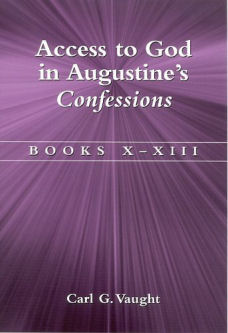
|
Posted September 19, 2005
Book: Access to God in Augustine’s Confessions: Books X – XIII Author: Carl G. Vaught State University of New York Press, NY, pp.280 An Excerpt from the Jacket:
. . . Books X – XIII of the Confessions begin after Augustine has become Bishop of Hippo and they are separated by more than ten years from the episodes recorded in the previous nine books of the text. This establishes the narrative in the present and speaks of the “believing sons of men.” Augustine explores how memory, time, and creation make the journey toward God and the encounter with God possible. Vaught analyzes these conditions in order to unlock Augustine’s solutions to familiar philosophical and theological problems. He also tackles the frequently discussed problem of the alleged disconnection between the earlier books and the last four books by showing how Augustine binds experience and reflection together. An Excerpt from the Book: Augustine’s description of the way in which his memory functions is one of the classic passages in the Confessions, and it is of significance because it reflects the process he undergoes in writing a book that requires him to remember so many things about his past. In this connection Augustine says, When I am in that realm, I ask whatsoever I want to be brought forth. Certain things cme forth immediately. Certain other things are looked for longer, and are rooted out as it were from some deeper receptacles. Certain others rush forth in mobs, and while some different thing is asked and searched for, they jump in between, as if to say, “Aren’t we perhaps the ones?” By my heart’s hand I brush them away from the face of my remembrance until what I want is unveiled and comes into sight from out of its hiding place. Others come out readily and in unbroken order, just as they are called for: those coming first give way to those that follow. On yielding, they are buried away again, to come forth when I want them. All this takes place when I recount anything from memory. This passage points in three directions. First, it emphasizes Augustine’s active role in remembering: he does not remain passive when he turns inward to the storehouse of memory, but asks what he wants to remember to reveal itself. Second, some of the things he seeks are harder to find than others: some of them come forth immediately; others bury themselves in secret cells; and still others rush forth in crowds, even when Augustine does not ask them to appear. Finally, some images suggest themselves without effort and in continuous order, where the linear dimension of the Confessions depends upon Augustine’s capacity to remember his experiences in this way. . . . Memory as a context in which can attempt to find God is finite and infinite at the same time; and in this respect, it reflects the (finite-infinite) structure of the soul as it journeys toward God. Once more, we find that the structure of memory is the condition that makes the journey toward God possible, and it is an image of this journey at the distinctively reflective level. Table of Contents: Introduction 1. The Nature of Memory 2. The Problem of Time 3. The Hermeneutics of Creation |
|
